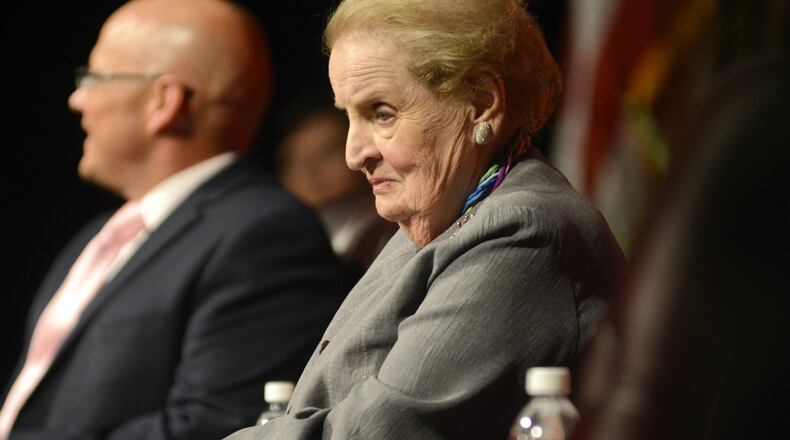The speech delivered by the 64th Secretary of State started out lighthearted but was an earnest discussion about the foreign policy challenges the new president of the United States will inherit — “and what they mean for America and its role in the world.”
“These challenges will inevitably affect the global marketplace, and I know as students of the Farmers School many of you will be in position to do something about them,” she said.
Albright had provided a similar memorandum to President Barack Obama and had intended to provide a similar memo to the next president. But in the first of two barbs toward GOP presidential nominee Donald Trump, she said she has campaigned for Democratic Party presidential nominee Hillary Clinton to ensure “the president-elect is someone that might actually read a memo.”
RELATED: Albright’s zingers about Miami U.’s green beer and Big Ben
She also said these are reasons “the next U.S. president will have an awful weight to carry on her shoulders.”
Seth Unger, an Ohio spokesman for Trump, said Albright “loses all credibility by not speaking out about the rigged system in Washington, and her tone-deaf criticism of Mr. Trump’s plans to secure our borders and level the playing field on trade are completely out of touch with working Ohioans.”
Albright’s five foreign policy challenges for the next president, include:
- The first, "and most urgent," Albright said, is of terrorism and the collapse of order in the Middle East and North Africa. She said this region is "of enormous and strategic economic importance" and influencing the area is limited, "as we saw with the Arab Spring, which has since found is a movement for all seasons."
“In that evolving landscape, no group has gained more infamy than ISIS, which calls itself the Islamic State, which is neither Islamic nor a state,” she said.
Albright said ISIS see themselves as “warriors” and defenders of the Muslim faith, but they’re terrorists.
- Russia's aggression and the "weakening of our European allies" is a second issue the next president must address, she said.
“The two are connected because (Russian President) Vladmir Putin has made it his mission to sow discord and disability within Europe,” Albright said.
She said his “illegal invasion” of the Ukraine has put the vision of a peaceful Europe “at grave risk,” and it “continues to roil” the continent already dealing with issues of its own, such as terrorism and Brexit.
- And an influential America is also key for East Asia.
She said the next president will need to work to prevent a conflict triggered by a nuclear-armed North Korea and manage “our increasingly complicated relationship” with China.
She said Kim Jong Un “seems determined” to own a nuclear weapon that can reach the continental United States.
- Albright said there's a gathering backlash of globalization, something "that wasn't made in America … (or) some CIA plot."
But because of the size of the United States, “We have the largest stake in guiding it in the right direction,” she said. “Economic integration is the surest road to faster growth and broader development from rich and poorer nations alike,” she said.
“Technology has been a gift that has empowered ordinary people around the world,” she said.
“It’s now apparent to everyone that people are starving in some countries while in others diet books are best sellers,” she said. “Technology has dis-aggravated voices and amplified peoples frustrations but they still look for government to solutions but the challenge is government moves too slowly for a world that spins at internet speed.”
This will require collaboration between governments, businesses and institutions, such as Miami University.
About the Author



